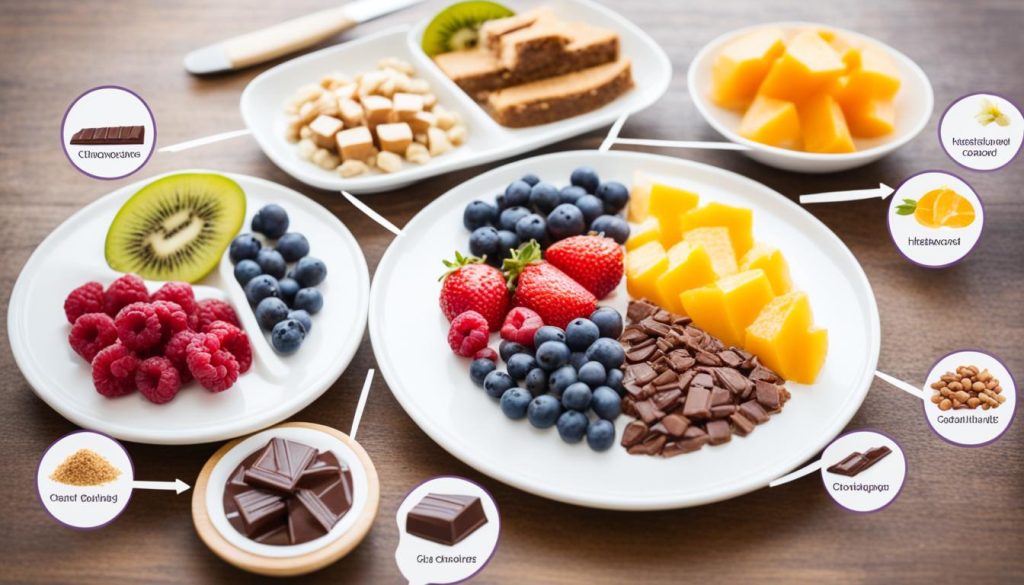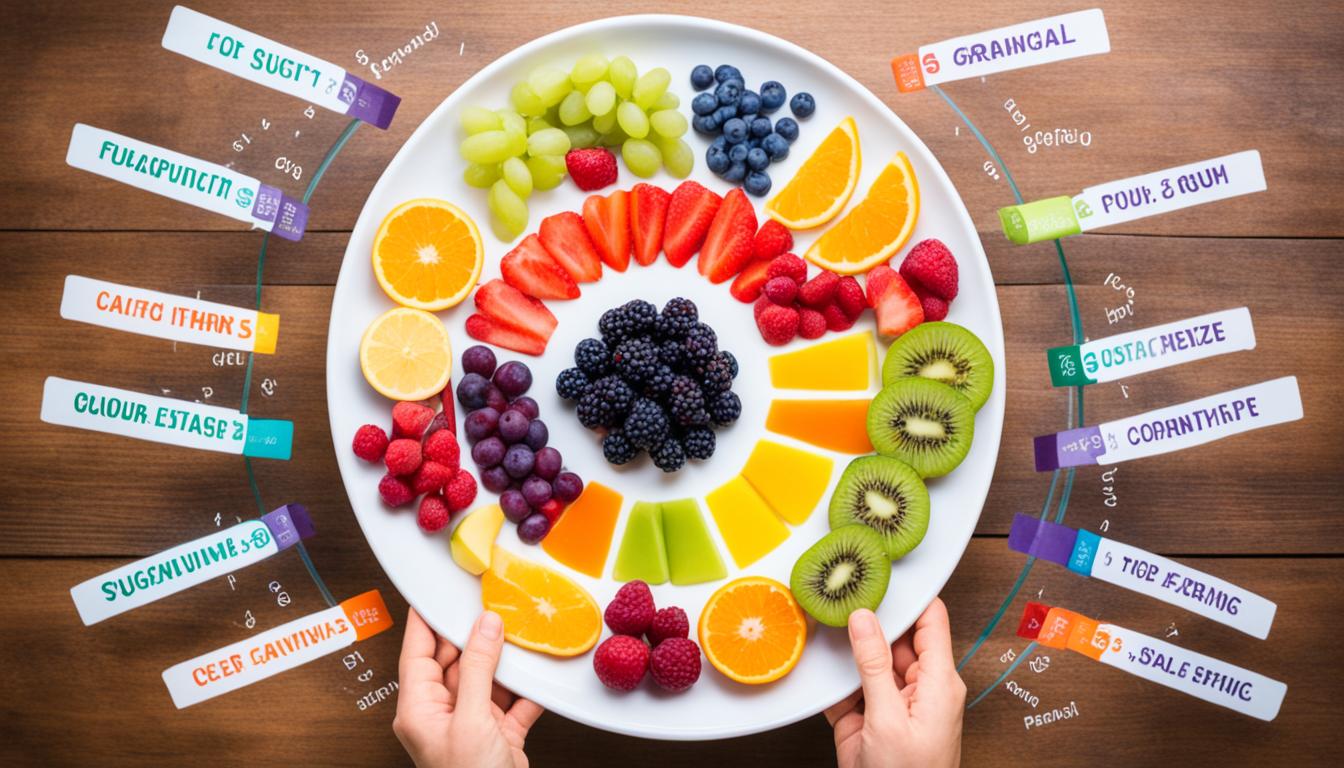Are you aware of how many grams of sugar you should be consuming in a day? Daily sugar intake plays a crucial role in maintaining a healthy lifestyle. The recommended sugar consumption guidelines can help you understand the sugar limit per day and make informed choices about your diet.
According to data, American adults consume an average of 17 teaspoons of added sugar every day, which exceeds the recommended amount for both men and women. Children and young adults aged 2-19 consume 16 teaspoons of added sugar per day. The leading source of added sugars in the American diet is beverages, particularly soft drinks and fruit drinks, followed by snacks and sweets.
Excessive sugar consumption can lead to various health problems, such as weight gain, increased risk of heart disease, and type 2 diabetes. It’s crucial to know the recommended guidelines for sugar intake to maintain a balanced and healthy lifestyle.
In this article, we will dive deeper into the effects of too much sugar on the body, the recommended sugar intake guidelines, and how to identify and reduce added sugar in your diet. By understanding these factors, you can make conscious choices to maintain a healthy sugar balance and improve your overall well-being.
The Effects of Too Much Sugar on the Body
When the body consumes excessive amounts of sugar, it can have a negative impact on overall health. The rate at which sugar is absorbed by the body depends on the source. Added sugars, such as those found in soda and sweets, are quickly absorbed, causing a spike in blood sugar levels. This can lead to a range of health issues, including:
- Weight gain: Excess sugar consumption can contribute to weight gain and obesity. Consuming sugary beverages, snacks, and desserts can lead to an increase in calorie intake.
- Increased risk of heart disease: High sugar intake has been linked to an increased risk of heart disease. A diet rich in added sugars can elevate blood pressure, triglyceride levels, and inflammation.
- Type 2 diabetes: Regularly consuming too much sugar can lead to insulin resistance, which can eventually progress to type 2 diabetes.
- Dental problems: Sugar is a major contributor to tooth decay and cavities. Bacteria in the mouth feed on sugar, producing acids that erode tooth enamel.
- Energy fluctuations: Consuming excessive amounts of sugar can lead to energy spikes and crashes. These fluctuations can affect productivity, mood, and overall well-being.
It’s important to be mindful of sugar consumption and make healthier choices to minimize the associated health risks. While alternative sugars like honey or maple syrup may seem like healthier options, they should still be consumed in moderation as they are processed by the body as sugar.

The Health Risks of Excessive Sugar Consumption
| Health Risks | Description |
|---|---|
| Weight gain | Excess sugar consumption can contribute to weight gain and obesity. |
| Increased risk of heart disease | A high sugar-intake diet is linked to elevated blood pressure, triglyceride levels, and inflammation, which increase the risk of heart disease. |
| Type 2 diabetes | Regularly consuming too much sugar can lead to insulin resistance and increase the risk of developing type 2 diabetes. |
| Dental problems | High sugar intake contributes to tooth decay and cavities due to the production of acid by oral bacteria. |
| Energy fluctuations | Consuming excessive amounts of sugar can cause energy spikes and crashes, affecting mood and overall well-being. |
It is crucial to be aware of the potential health risks associated with excessive sugar consumption and take steps to reduce sugar intake for maintaining optimal health.
Recommended Sugar Intake Guidelines
The American Heart Association provides clear guidelines on how much added sugar individuals should consume on a daily basis. These recommendations are based on the impact of sugar on overall health, including heart health. It’s important to be mindful of the sugar content in beverages and snacks, as they can contribute significantly to daily sugar intake.
The American Heart Association recommends that:
- Men consume no more than 9 teaspoons (36 grams) of added sugar per day.
- Women limit their intake to 6 teaspoons (25 grams) of added sugar per day.
Staying within these sugar recommendations can help individuals maintain a healthier lifestyle and reduce the risk of health issues associated with excessive sugar consumption.
Reading food labels is crucial in understanding the amount of added sugars in products. By being mindful of added sugars and making informed choices, individuals can better manage their daily sugar intake and stay within the recommended guidelines.
Understanding Daily Sugar Allowance:
| Demographic | Recommended Daily Added Sugar Limit |
|---|---|
| Men | 9 teaspoons (36 grams) |
| Women | 6 teaspoons (25 grams) |

By being aware of the recommended sugar intake guidelines and making conscious decisions about sugar consumption, individuals can take control of their health and maintain a balanced lifestyle.
Identifying and reducing Added Sugar in Your Diet
Reducing your sugar intake can have numerous health benefits. To start cutting back on added sugars, it’s essential to identify where they hide in your diet. By reading food labels and being aware of common aliases for added sugars, you can make informed choices and reduce your overall sugar consumption.
Reading Food Labels
When shopping for groceries, take the time to read and understand food labels. Look for terms like high-fructose corn syrup, cane sugar, evaporated cane juice, brown sugar, and other names for added sugars. Remember, ingredients are listed in descending order by weight, so the higher up sugar appears on the list, the more it contains.
The updated Nutrition Facts label now includes a separate line for added sugars, making it easier to spot how much sugar is added to a product. This distinction helps you differentiate between naturally occurring sugars, such as those in fruits, and added sugars. Aim for products with lower amounts of added sugars to reduce your overall intake.
Choosing Whole Foods
One effective way to reduce sugar intake is by opting for whole, unprocessed foods. Fruits, vegetables, whole grains, lean meats, and dairy products without added sugars are excellent choices. These foods offer essential nutrients and are generally lower in added sugars compared to processed, packaged foods.
When grocery shopping, focus on the perimeter of the store, where fresh produce, meats, and dairy products are usually located. This way, you’ll be less tempted by the aisles filled with sugary snacks and sweetened beverages.
Making Small Changes
Reducing added sugar doesn’t mean completely eliminating it from your diet. Instead, start by making small changes that can add up to a significant impact over time. Here are a few tips to help you get started:
- Swap sugary sodas and fruit juices for water, sparkling water, or unsweetened herbal tea.
- Choose unsweetened versions of foods like yogurt and cereal, and add fresh fruits for natural sweetness.
- Use less sugar in your coffee or tea, gradually reducing the amount until you can enjoy it unsweetened.
- Experiment with herbs and spices to add flavor to your meals without relying on sugar.
By gradually reducing your sugar intake and making healthier choices, you’ll be on your way to a balanced and nutritious diet. Remember, small changes can have a big impact on your overall health and well-being.

Conclusion
Excessive sugar intake can have serious implications for our health. However, by adhering to recommended sugar intake guidelines and being vigilant about added sugars in our diet, we can strive to maintain a healthier and more balanced lifestyle.
To achieve a healthier sugar balance, it is crucial to reduce our consumption of sugary drinks and snacks. These are often the main culprits behind excessive sugar intake. Opting for healthier alternatives and choosing unsweetened options can make a significant difference in our overall sugar consumption.
Reading food labels is another essential practice to be mindful of added sugars. By educating ourselves on ingredient lists and being aware of terms like high-fructose corn syrup or cane sugar, we can make informed choices and reduce our sugar intake considerably.
Ultimately, maintaining a healthy sugar balance requires prioritizing education and awareness. By understanding the detrimental effects of excessive sugar consumption, making intentional changes to our diet, and choosing whole foods, we can take control of our sugar intake and promote our overall well-being.




